|
 Origin Origin
Worship
ceremony is a way people show their appreciation
to the ancestors. Each
tribe has its own worship ceremonies.
The
Truku
tribe
holds the Thanksgiving Ceremony in awe and with
appreciation to thank the ancestors for their
blessings.
There are no impressive scenes in traditional
ceremonies, only dignified atmosphere.
As
members of Truku
tribe, we would like
to introduce the Thanksgiving
Ceremony to every one because we believe it is
our responsibility to explore the profoundness
of this important tribal ceremony.
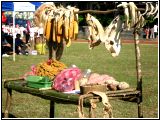 |
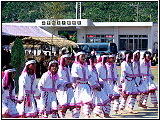 |
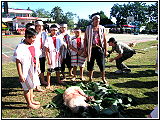 |
|
Objects on the ceremony stage |
Performances posterior to the
ceremony |
Preys to the hunting team |
We visited Shioulin
Township and Wanrong Township in Hualien
County, which cover the biggest population
of Truku tribe in Taiwan, aiming to explore
the great Thanksgiving Ceremony through
participation.
During the ceremony, we
could see principles left by the ancestors,
from the preparation of items offered at the
altars, the process of the ceremony, the
oracle’s prayers to the presentation of
celebration dances. Though videos and
documents, we share our past; through actual
participation and Thanksgiving activities,
we experience the solemn ceremony; through
ceremonies, music, and dances, we experience
traditional cultures; through interviews
with elders and people from the communities,
we learn from the wisdom passed down by the
ancestors.
The teaching staff and
students of Jian Ching Elementary School
would like to take the responsibility of
receiving and passing on the cultures.
Through visits and inspections, we continue
and succeed the cultures of the tribe with
the school and resources provided by the
community to offer more people the
opportunity of understanding the cultures of
Truku tribe.
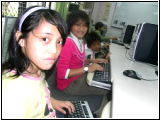 |
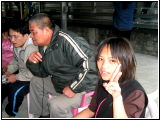 |
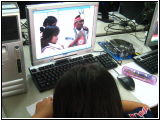 |
|
Through computerized information
process and interviews |
Through video conferences |
Through participation thoughts and
reports |

 Description
of our community Description
of our community
Truku tribe is traditionally
located at the river terraces, tablelands and
mountain roots around Heping River, Liwu River,
Mugua River, Chiyagan River, Wanli River,
Taiping River, and Lakulaku River in the
mountain areas in Eastern Taiwan. During
1931-37, after Wushe Incident, the Japanese
government forced the tribal people in The
Central Mountain Range move to the current tribe
location for management purposes.
The current distribution of
Truku tribe ranges from Heping River to Taiping
River, covering Songlin, Lushan, and Jingguan of
Nantou County Ren-ai Township, Hualien County
Shioulin Township and Wanrong Township, Chosi
Township Lishan Village, and Chi-an Township
Chingfeng Village, Nanhua Village, and Fuhsing
Village. Currently, Hualien County Shioulin
Township and Wanrong Village cover the biggest
Truku population in Taiwan.
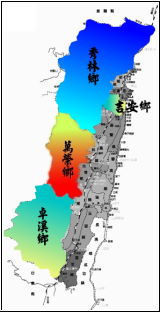 |
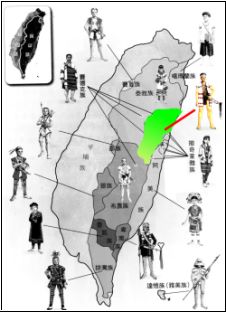 |
|
Truku tribe in |
Truku tribe in |
During the history, Truku
tribe has been used to migrate. The historical
data about Truku people are limited due to their
habit of living in the deep and vast mountains,
loose distribution of residents, and living on
their own, making it difficult for outsiders to
visit or contact them. However, their
diversified, unique and rich cultures are still
worthy of our researches.

 Sitemap Sitemap
Project Narrative
 Website Website
 Project
Overview Project
Overview
 Project
Elements Project
Elements
 Contributions Contributions
Home
 Project
Background Project
Background
 Our
Community Our
Community
 Sitemap Sitemap
About Truku tribe
 History
and geographical environment History
and geographical environment
 Languages
and cultures Languages
and cultures
 Social
systems Social
systems
 Ceremonies Ceremonies
 Historical
events Historical
events
 Myths
and tales Myths
and tales
About Shinbaiyang
 Geographical
location Geographical
location
 Naming
the places Naming
the places
 Migration Migration
 Awei
family Awei
family
 Local
features Local
features
Thanksgiving ceremony
 “Thanksgiving” “Thanksgiving”
 Meaning
of the ceremony Meaning
of the ceremony
Experiencing Thanksgiving
ceremony
 Preparation Preparation
 Process Process
 Songs Songs
 Dances Dances
The Priest
 Clothing Clothing
 Prayers Prayers
 Qualification Qualification
Sacrificial offerings
 Meaning Meaning
 Pig
killing ceremony Pig
killing ceremony
 Types Types
Project research
 Research
process Research
process
 Interview
records Interview
records
 Experience
courses Experience
courses
 Dance
courses Dance
courses
 Social
field Social
field
 Research
results Research
results
 Acknowledgement Acknowledgement
 Research
team Research
team
 References References
 |